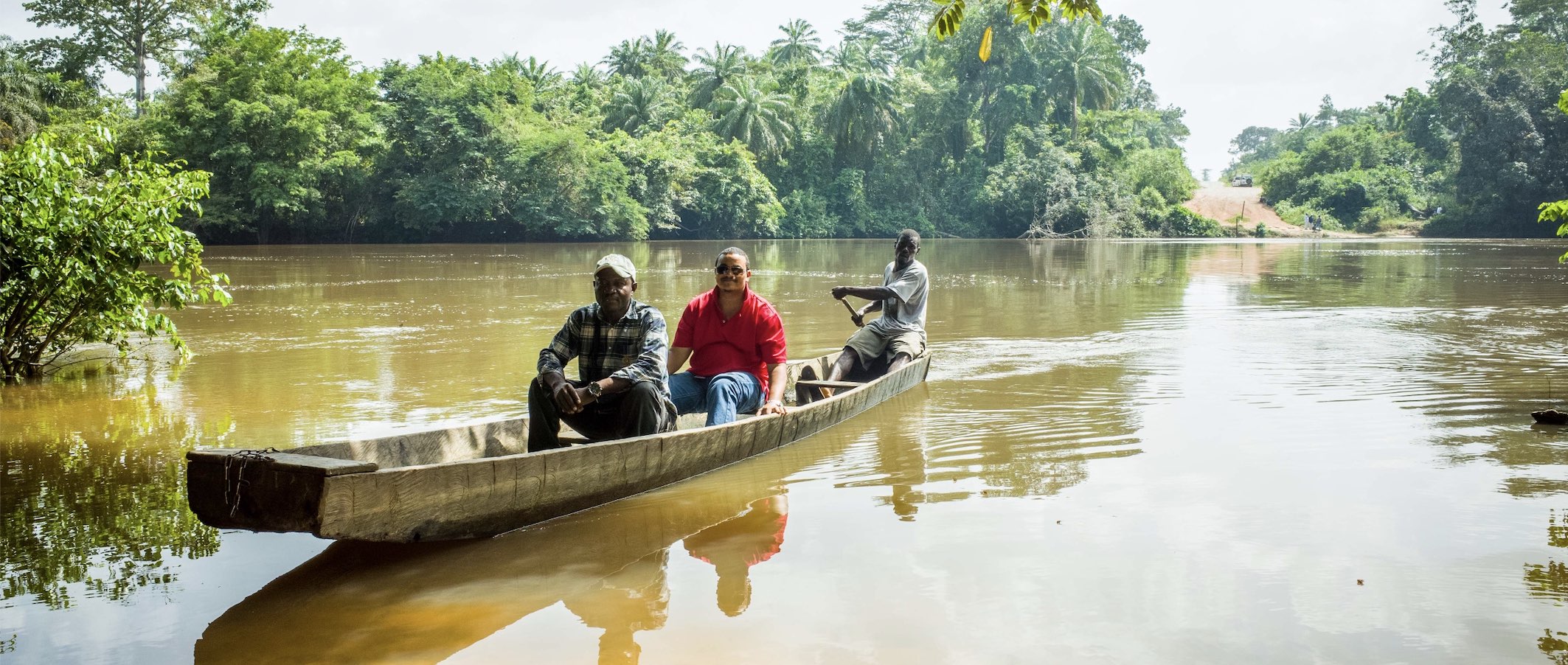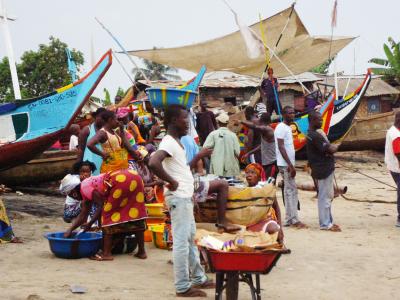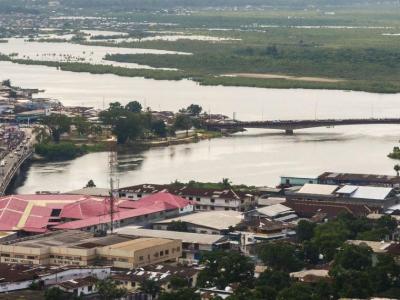
Photo:
The project’s objective was to support the Government of Liberia in advancing its National Adaptation Plan (NAP) process in climate-sensitive sectors: agriculture, energy, waste management, forestry, health, and coastal areas. The project was a first of its kind, approved by the Green Climate Fund (GCF) Board in November 2016 prior to the introduction of the GCF Readiness guidebook. The project informed the introduction and subsequent evolution of the guidelines on adaptation planning in Liberia.
Significant outcomes and outputs were achieved across four key areas. In Outcome 1, institutional frameworks were strengthened, and a climate change strategy was developed. Outcome 2 focused on expanding the knowledge base through risk assessments, economic studies, and a knowledge-sharing platform. Outcome 3 enhanced capacity for mainstreaming climate change into planning and budgeting, including technical guidelines and capacity-building programs. Lastly, Outcome 4 supported the scaling up of prioritized adaptation investments, identified policy options, and fostered public-private partnerships. These efforts contributed to Liberia's National Adaptation Plan, promoting resilience and sustainability in the face of climate change.
- National
- National Governments
- Liberia EPA
The GCF-funded project "Advance the NAPs process for medium-term investment planning in climate-sensitive sectors (i.e. agriculture, energy, waste management, forestry and health) and coastal areas in Liberia" aimed to strengthen institutional frameworks and coordination for the implementation of the NAP process, expand the knowledge base for scaling up adaptation, build capacity for mainstreaming climate change adaptation into planning and budgeting processes and systems, and formulate financing mechanisms for scaling-up adaptation.
In addition to the project delivery partner, the Environment Protection Agency and the National Climate Change Secretariat, other key partners included the Ministry of Finance and Development Planning, Ministry of Agriculture, National Disaster Management Agency, University of Liberia, Liberia Maritime Authority, Bureau of National Fisheries, Liberia National Department of Meteorology, Ministry of Mines & Energy, Ministry of Health, Liberia Institute of Statistics and Geo-Information Services, and the University of Liberia.
Liberia, like other developing countries, especially Least Developed Countries (LDCs), is vulnerable to the impacts of climate change. Despite having a low carbon footprint, the country anticipates severe consequences in key sectors, including agriculture, fisheries, forests, energy production related to the availability of water resources, coastal areas, and health. Approximately 70% of the population relies on agriculture for their livelihoods, with rural areas experiencing up to 80% vulnerability to food insecurity, according to the Environmental Protection Agency. Coastal regions, spanning 350 miles, face challenges from ongoing coastal erosion, sea level rise, storms, precipitation changes, and warmer ocean temperatures. Health risks include heightened vulnerability to diseases like malaria, cholera, and diarrheal diseases. Moreover, climate change may adversely affect hydroelectric generation from the Mount Coffee hydropower plant.
Liberia initiated its NAP process in 2015, establishing a roadmap in consultation with key stakeholders. This roadmap, grounded in the evaluation of existing climate initiatives and identification of gaps and capacity needs, serves as a guide for the short, medium, and long-term implementation of the NAP process in Liberia.
Key Project Results
Liberia submitted its NAP to the UNFCCC in 2021, with the project providing support in its development, including organizing a multi-sectoral working group to review and validate the final document. The project also achieved the following:
- Developed a comprehensive Climate Change Policy and Response Strategy.
- Supported the ratification of the Paris Agreement.
- Established the School of Environment and Climate Change at the University of Liberia, offering four graduate programs.
- Assessed climate change impacts on gender.
- Developed tools for mainstreaming climate change into programmatic activities.
- Conducted climate vulnerability/economic assessments and developed adaptation plans for key sectors.
- Implemented financial management and capacity support, including an enterprise resource planning system for the Environmental Protection Agency (EPA).
- Supported the national disaster risk assessment, development of the National Disaster Risk Reduction strategy, and launched the disaster database platform.
- Integrated economic assessments of adaptation studies in key sectors and developed a policy paper highlighting economic impacts of climate change in Liberia.
- Deployed 25 rainfall stations across the country to support the early warning system.
- Conducted capacity building for effective appraisal of investment priorities in sector ministries and mainstreamed climate change adaptation in sector strategies and plans.
- Established programs to inform and learn from the private sector on identifying climate variability and managing climate change (including setting up a private sector climate action alliance - Private Sector Working Group on Climate Change Adaptation Formed)
- Conducted policy analysis for future financing instruments/options for adaptation, including identifying alternative funding sources.
- Developed information products to support the private sector, particularly micro, small, and medium enterprises, in integrating adaptation into their investment planning.
Crisis to Action: Liberia’s national adaptation plan addresses climate change (2023)
Liberia: Government Launches Country’s National Adaption Plan (2021)
Private Sector Working Group On Climate Change Adaptation Formed (2020)
National Adaptation Plans Report: Lessons from Liberia (2019)
University of Liberia launches new degree program on Environmental Studies (2019)
Building effective climate governance in Liberia (2018)
Need for Collective Partnership to Avoid Natural Hazards Stressed (2018)
Liberia Faces Natural Hazards Threat, EPA, UNDP Warn (2018)
University of Liberia to Commence Environmental Studies Soon (2018)
Liberia: 51 Vulnerable Youth and Women Trained in Production of Energy Efficient Cook Stoves (2018)
Integrating gender in the mitigation of climate change (2018)
EPA, UNDP Hold SDGs Training in Nimba (2018)
Liberia Launches National Policy and Response Strategy on Climate Change (2018)
UNDP and partners sign agreement on graduate programme for environmental studies (2018)
Liberia set to launch National Policy and Response Strategy on Climate Change (2018)
UNDP Equips EPA Monitoring System (2018)
National Disaster Management Agency, UNDP-Liberia Conduct Training on National Disaster Readiness (2018)
Government, Partners Launch National Adaptation Plan of Liberia (2018)
Environment chief: Why we’re prioritizing climate governance in Liberia (2018)
Liberia receives first instalment of US$2.2 million GCF grant for climate adaptation (2015)
GCF approves first grants for National Adaptation Planning in Liberia and Nepal (2015)
Outcome 1: Strengthening of Institutional Frameworks and coordination for the NAPs process.
In the latter part of 2020, key activities under this outcome focused on enhancing the financial management and operational capacity of the Environmental Protection Agency (EPA) and the Climate Change Secretariat. This involved the implementation of an enterprise resource planning system. Additionally, a video documentary was developed to catalog essential project results, featuring feedback from key stakeholders and partners. The aim is to document lessons learned, challenges, success stories, and illustrate the meaningful impact the project has had in supporting climate change adaptation planning in Liberia.
1.1 Climate change strategy and action plan for adaptation developed as part of the NAP process.
Adaptation strategies and action plans for agriculture, forestry, fisheries, and coastal areas have been developed. Additionally, a national climate change adaptation strategy and action plan have been produced and formally launched, including the publication of Liberia’s NAP (2020-2030) document.
1.2. Coordination and monitoring enhanced for climate change adaptation program development across sectors.
The project assisted the Environmental Protection Agency (EPA)/National Climate Change Secretariat (NCCS) by conducting a capacity assessment and providing training in financial management, procurement, human resources, and other operational capacities. Subsequently, an Enterprise Resource Planning (ERP) System was established. The aim is to enhance the EPA's capacity in budgeting, accounting, governance, funds flow, financial reporting, internal control systems, and auditing for funds accessed from both the national budget and external sources.
Outcome 2: Expansion of the knowledge base for scaling up adaptation.
Liberia has faced a shortage of scientific data on climate impacts, including limited knowledge of current climate variability and risks, as well as the absence of an early warning system. The project expanded the knowledge base for scaling up adaptation interventions through various activities. This includes conducting economic assessments of adaptation strategies to inform funding proposals and national policies. Climate vulnerability and risk assessments were carried out to establish an evidence base for research, planning, and implementing adaptation action plans. Additionally, a knowledge-sharing platform was developed to facilitate information exchange and collaboration.
2.1. Risk assessments and economic impact studies in climate sensitive sectors conducted and incorporated in official data systems.
The project conducted a climate vulnerability and risk assessment for several sectors, including coastal, agriculture, forestry, fisheries, energy, and health (ongoing). Simultaneously, awareness-raising initiatives with relevant stakeholders were undertaken.
2.2. Effective knowledge sharing platform as a resource for climate relevant planning established.
The project conducted a gap analysis and collaborated with relevant IT staff and an international consulting firm to develop a climate change knowledge management platform. This platform, hosted at http://ccksp.gnf.tf, aims to expand knowledge and build capacities within the Liberian government. It serves as a repository for climate change-related data and information and offers training programs for a diverse audience, including practitioners, students, policymakers, and advocates. The project conducted at least six training sessions for staff from sectors such as waste management, forestry, energy, health, agriculture, and coastal management.
2.3. Climate Change disasters-related database developed.
The project procured and supplied meteorology equipment, including 25 rain gauges, for the Meteorology Department. These rain gauges have been strategically installed nationwide to enhance the production and distribution of weather information to various users, including farmers and fishermen. In addition, six staff members from the Meteorology Department received training on the operation of the system, ensuring effective utilization of the equipment.
Outcome 3: Strengthened capacity for mainstreaming CCA into planning, and budgeting processes and systems.
The project supported the formulation of mechanisms for scaling up adaptation investments and addressing financial gaps through various activities. This included assessing economic impacts and opportunities arising from climate change.
3.1. Technical guidelines for the personnel of the Ministry of Finance & Development Planning and other relevant Ministries, to mainstream climate change into budgeting and planning processes incorporating gender disaggregated data.
The project developed technical guidelines for personnel at the Ministry of Finance & Development Planning (MFDP) and other relevant ministries. These guidelines are designed to facilitate the mainstreaming of climate change considerations into budgeting and planning processes. Additionally, training sessions were conducted to familiarize personnel from MFDP and other sectoral entities with the use of these guidelines.
3.2. Capacity building programs on implementing adaptation investments and strategies established.
The project conducted a capacity assessment and developed a three-year climate change capacity development plan for the EPA and key sectoral agencies. The University of Liberia initiated its graduate program in 2019, the "School of Environmental Studies and Climate Change (SESCC)," in partnership with the EPA and UNDP. The project facilitated the provision of climate change adaptation textbooks to the school and fostered a partnership between the University of Liberia and the Least Developed Countries Universities Consortium for Climate Change (LUCCC), promoting research, knowledge sharing, and education in climate change. Eleven government staff members completed international training in climate change adaptation in Israel, and a south-south exchange tour for policymakers on knowledge sharing was successfully completed.
3.3. Monitoring and reporting system to track adaptation investments and implementation.
The project developed a detailed design for tracking climate finance, reviewed by stakeholders. An IT firm was hired to support the creation of a climate finance tracking system, integrated with monitoring and evaluation (M&E) indicators, and training sessions on the climate-proofing tool were conducted for the EPA team and other stakeholders. The National Monitoring System was assessed, resulting in a report with recommendations for integration into the national financial reporting systems, incorporating tracking tools and criteria to estimate adaptation financing in Liberia.
Outcome 4: Mechanisms to support scaling up of prioritized adaptation investments and addressing of financial gaps.
Outcome 4 included policy analysis for future financing instruments and options for adaptation. Alternative funding sources, such as private and local funds, were identified. The project created information products to support private sector engagement, with a focus on micro, small, and medium enterprises, helping them integrate adaptation into their investment planning. Furthermore, the project supported the development of costed investment plans for the agricultural sector and coastal areas in collaboration with partners. It successfully identified and prioritized at least two bankable projects and developed strategies to encourage private investments in new technologies and foster public-private partnerships for implementing climate change adaptation interventions.
4.1. Sector and area based costed investment plans prepared for scaling up adaptation in agriculture and coastal areas that take into account climate change risks and opportunities.
The project successfully developed and validated adaptation options for priority sectors, including agriculture, forestry, coastal areas, waste management, energy, and fisheries. This included the preparation of two bankable adaptation projects (agriculture and forestry, mangroves and ecotourism) for multi-sector implementation.
4.2. Policy options for scaling up financing for adaptation investments identified and recommended.
The project developed specific climate finance advisory products, offering detailed information on the country's climate finance landscape, criteria, funding amounts, and eligibility requirements. Stakeholders underwent climate finance training to enhance their understanding of available financing options. The project's identification of additional financing windows beyond traditional sources provides Liberia with opportunities to expand its resource mobilization for climate change action.
4.2. Foster Public Private Partnerships (PPPs) to support adaptation investments.
The project facilitated the creation of a private sector platform and developed knowledge products to support climate change adaptation planning. This included capacity-building support to encourage private sector engagement in climate action and attract private finance through partnerships and other financing options. The establishment of the Liberia Private Sector Climate Change Alliance served as a platform for collaboration between the private sector, government, and other stakeholders on climate initiatives. Great enthusiasm exists within the private sector to engage the government upon the realization that climate change represents a serious risk to private investment.


